Related Research Articles
Redbone is a term historically used in much of the southern United States to denote a multiracial individual or culture. Among African Americans the term has been slang for fairer-skinned Black people, often for women specifically or for Black people with red undertones. In Louisiana, it also refers to a specific, geographically and ethnically distinct group.

Xavier University of Louisiana (XULA) is a private historically black Catholic university in New Orleans, Louisiana. It is the only Catholic HBCU. Upon the canonization of Katharine Drexel in 2000 it became the first Catholic university founded by a saint.
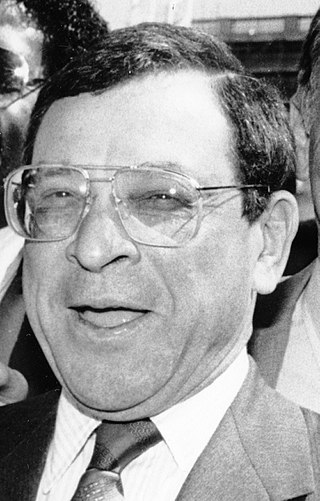
Ernest Nathan "Dutch" Morial, was an American politician and a leading civil rights advocate. He was the first black mayor of New Orleans, serving from 1978 to 1986. He was the father of Marc Morial, who served as Mayor of New Orleans from 1994 to 2002.
Homer Adolph Plessy was an American shoemaker and activist, who was the plaintiff in the United States Supreme Court decision Plessy v. Ferguson. He staged an act of civil disobedience to challenge one of Louisiana's racial segregation laws and bring a test case to force the U.S. Supreme Court to rule on the constitutionality of segregation laws. The Court decided against Plessy. The resulting "separate but equal" legal doctrine determined that state-mandated segregation did not violate the Fourteenth Amendment to the United States Constitution as long as the facilities provided for both black and white people were putatively "equal". The legal precedent set by Plessy v. Ferguson lasted into the mid-20th century, until a series of landmark Supreme Court decisions concerning segregation, beginning with Brown v. Board of Education in 1954.

Straight University was an American historically black college that operated between 1868 and 1934 in New Orleans, Louisiana. After struggling with financial difficulties, it was merged with New Orleans University to form Dillard University.
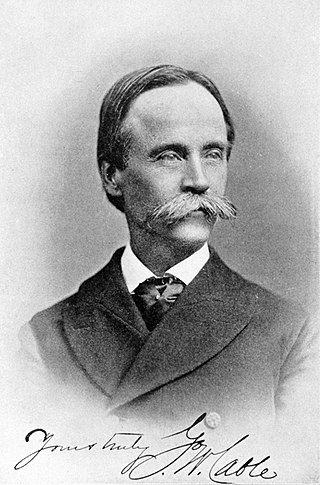
George Washington Cable was an American novelist notable for the realism of his portrayals of Creole life in his native New Orleans, Louisiana. He has been called "the most important southern artist working in the late 19th century", as well as "the first modern Southern writer." In his treatment of racism, mixed-race families and miscegenation, his fiction has been thought to anticipate that of William Faulkner.
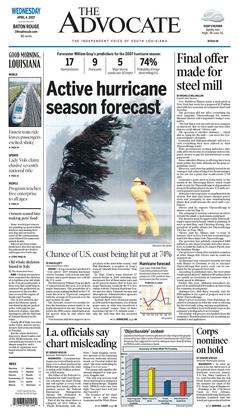
The Advocate is Louisiana's largest daily newspaper. Based in Baton Rouge, it serves the southern portion of the state. Separate editions for New Orleans, The Times-Picayune | The New Orleans Advocate, and for Acadiana, The Acadiana Advocate, are published. It also publishes gambit, about New Orleans food, culture, events, and news, and weekly entertainment magazines: Red in Baton Rouge and Lafayette, and Beaucoup in New Orleans.
The Louisiana Weekly is a weekly newspaper published in New Orleans, Louisiana. It emphasizes topics of interest to the African-American community, especially in the New Orleans area and south Louisiana. It has an estimated weekly circulation of 6,500.
Sherman Nathaniel Copelin, Jr., is an American politician and businessman from his native New Orleans, Louisiana.
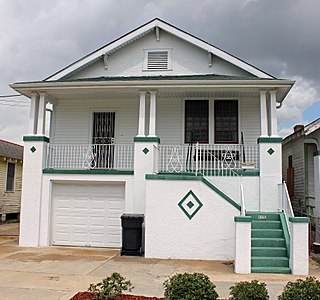
Alexander Pierre "A. P." Tureaud Sr. was an African-American attorney who headed the legal team for the New Orleans chapter of the NAACP during the Civil Rights Movement. With the assistance of Thurgood Marshall and Robert Carter from the NAACP Legal Defense and Educational Fund, A. P. Tureaud filed the lawsuit that successfully ended the system of Jim Crow segregation in New Orleans. That case paved the way for integrating the first two elementary schools in the Deep South.
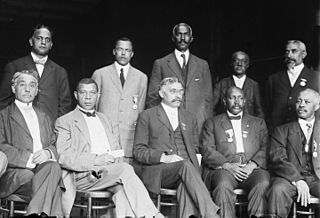
The National Negro Business League (NNBL) was an American organization founded in Boston in 1900 by Booker T. Washington to promote the interests of African-American businesses. The mission and main goal of the National Negro Business League was "to promote the commercial and financial development of the Negro." It was recognized as "composed of negro men and women who have achieved success along business lines". It grew rapidly with 320 chapters in 1905 and more than 600 chapters in 34 states in 1915.
The Louisiana Democratic Party is the affiliate of the Democratic Party in the state of Louisiana.
The Creoles of color are a historic ethnic group of Louisiana Creoles that developed in the former French and Spanish colonies of Louisiana, Mississippi, Alabama, and Northwestern Florida, in what is now the United States. French colonists in Louisiana first used the term "Creole" to refer to people born in the colony, rather than in Europe, thus drawing a distinction between Old-World Europeans and Africans from their descendants born in the New World. Today, these Creoles of color have assimilated into Black American culture, while some retain their distinct identity as a subset within the broader African American ethnic group.
The media of New Orleans serve a large population in the New Orleans area as well as southeastern Louisiana and coastal Mississippi.
William Etienne "Bill" Pajaud was an African-American artist, primarily working in watercolor, known for his paintings exploring themes of jazz. He was born in New Orleans, Louisiana, and died in Los Angeles, California, on June 16, 2015, at the age of 89. He was the curator of the Golden State Mutual Life Insurance Fine Art Collection.

Arthur P. Bedou was an African-American photographer based in New Orleans. Bedou was, for a time, the personal photographer of Booker T. Washington, and documented the last decade of Washington's life. He also documented campus life at Xavier University of Louisiana, the Tuskegee Institute, and the city life of New Orleans, especially the city's black residents.

In the United States, Black-owned businesses, also known as African American businesses, originated in the days of slavery before 1865. Emancipation and civil rights permitted businessmen to operate inside the American legal structure starting in the Reconstruction Era (1863–77) and afterwards. By the 1890s, thousands of small business operations had opened in urban areas. The most rapid growth came in the early 20th century, as the increasingly rigid Jim Crow system of segregation moved urban Blacks into a community large enough to support a business establishment. The National Negro Business League—which Booker T. Washington, college president, promoted—opened over 600 chapters. It reached every city with a significant Black population.
Albert Walter Dent was an academic administrator who served initially as business administrator of Flint-Goodridge Hospital and later as president of Dillard University (1941–1969), a predominantly black liberal arts college in New Orleans, Louisiana. In these roles, he was a community leader who improved education and health care for African-Americans and impoverished people in the American South.

The Southwestern Christian Advocate (1877–1929) was an American newspaper published by the Methodist Episcopal Church in New Orleans, Louisiana and distributed in the Southern United States. It was an African American newspaper that was equally read by the White community, this was more so than any other African American newspaper in the Union.

Aristede Dejoie was a businessman and state legislator in Louisiana. He served as a member of the Louisiana House of Representatives from 1872 to 1874 and 1877 to 1879.
References
- 1 2 3 Ingham, John N.; Feldman, Lynne B. (1994). African-American Business Leaders: A Biographical Dictionary. Westport, CT: Greenwood Publishing Group. p. 174. ISBN 0313272530.
- 1 2 3 Honora, Jari (20 August 2015). "The Dejoies of New Orleans". Creolegen. Retrieved 5 March 2016.
- 1 2 "The Louisiana Weekly turns 89 with this Edition". The Louisiana Weekly. September 22, 1014. Retrieved 14 March 2016.
- ↑ Cobb, Sarah; Mandel, Sarah. "The Louisiana Weekly". Media Nola. Tulane University. Archived from the original on 14 March 2016. Retrieved 5 March 2016.
{{cite web}}: CS1 maint: unfit URL (link) - ↑ DeCuir, Sharlene Sinegal (May 2009). Attacking Jim Crow: Black Activism in New Orleans, 1925-1941 (PDF). Baton Rouge: Louisiana State University. pp. 156–171. Archived from the original (PDF) on 3 March 2016. Retrieved 6 March 2016.
- ↑ "Directory of Members". New Orleans Regional Black Chamber of Commerce. Archived from the original on 4 December 2015. Retrieved 5 March 2016.